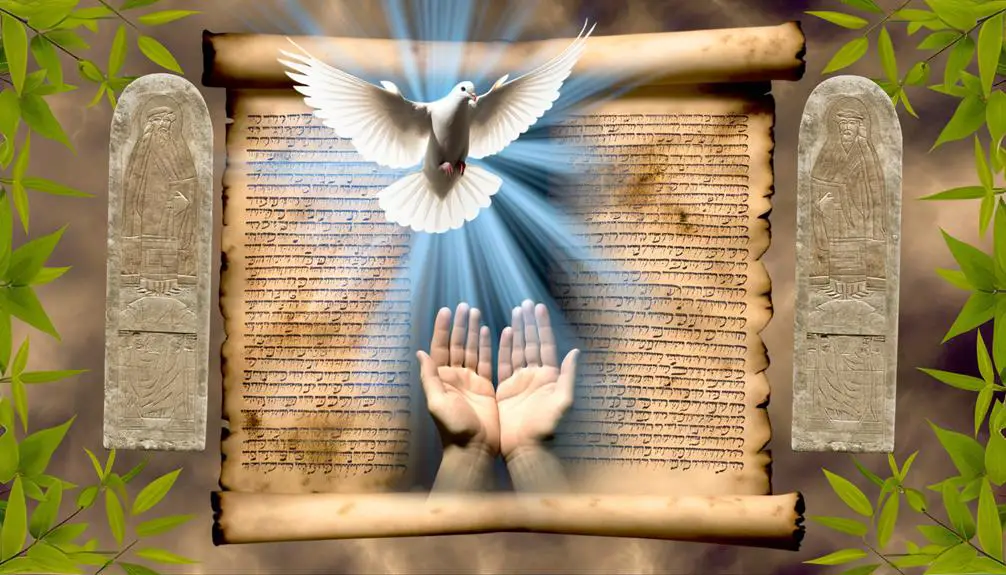A deep dive into the biblical context of swearing reveals its profound implications on ethics and promises, inviting further exploration.

What Does Swear Mean in the Bible
Just as you've stumbled upon a swear word in your daily life and pondered its weight, the Bible also addresses the concept of swearing, though in a much different context.
You'll find that swearing in the scriptures isn't about vulgar language but involves making solemn promises or oaths to God.
This ancient practice carries significant implications, from the historical context of these oaths to their consequences when broken.
As you explore further, you'll uncover how these biblical teachings on swearing might still resonate or conflict with modern interpretations and ethical considerations, sparking a rich discussion on the relevance of these ancient guidelines in today's world.
Key Takeaways
- Swearing in the Bible involves invoking divine witness to a solemn promise or vow.
- It includes various forms like personal vows, oaths of allegiance, and divine covenants.
- False swearing, considered a severe offense, carries spiritual and communal consequences.
- Biblical guidance on swearing emphasizes integrity and the sanctity of spoken words.
Historical Context of Swearing

In examining the historical context of swearing in the Bible, it's essential to recognize that these oaths weren't mere words but solemn vows deeply intertwined with the cultural and religious fabric of ancient societies. You'll find that language evolution plays a pivotal role in understanding the nuances of these commitments. As languages developed over centuries, the meanings of words, including those related to oaths, shifted. These changes weren't arbitrary but were closely linked to the evolving cultural implications of swearing.
You must consider how ancient societies perceived the act of swearing. Unlike today, where swear words often carry a negative connotation or are used casually in speech, in biblical times, to swear an oath was to invoke the divine as a witness to one's promise. This act wasn't taken lightly; it was a profound expression of one's integrity and commitment to a cause or agreement.
Furthermore, the cultural implications of swearing were significant. In a time when written contracts weren't as prevalent, and the legal system wasn't as developed as it is today, oaths served as binding verbal contracts. They were a means of establishing trust and accountability in personal, political, and religious relationships. The weight of an oath was such that breaking it could lead to severe social, spiritual, and sometimes even physical consequences.
Through this lens, you can appreciate the complexity of swearing in the Bible. It wasn't merely about the words spoken but about the societal and religious constructs that gave those words power and meaning.
Types of Oaths in Scripture

While exploring the types of oaths mentioned in scripture, it's crucial to understand that these commitments ranged from personal vows to solemn promises before God, each carrying distinct implications and consequences. The Bible delineates various forms of oaths, underscoring their significance in the lives of believers and the broader religious community.
Firstly, you encounter personal vows, a profound form of commitment where individuals pledge to perform specific acts or abstain from certain behaviors. These are often made in moments of desperation or profound gratitude, reflecting a deep personal conviction and a direct promise to God. The significance of these vows lies in their voluntariness, marking a personal decision to dedicate something of oneself to God's service.
Another category involves oaths of allegiance, where one swears loyalty or fidelity to a leader or God. These oaths were pivotal in establishing and reinforcing social and religious order, symbolizing a bond not just between individuals but within the community as a whole.
Covenants, or divine promises, represent a unique form of oath where God initiates a solemn agreement with His people, promising blessings in return for obedience. These are foundational to understanding the relationship between God and humanity, illustrating His faithfulness and the expected reciprocal commitment from His people.
Lastly, vow variations in scripture also include conditional oaths, where the fulfillment of the promise is contingent upon the occurrence of a specified event. This type underscores the dynamic nature of human-divine interaction, where human actions can invoke divine responses based on the conditions of the oath.
Each type of oath in scripture reveals layers of meaning about commitment, faith, and the nature of one's relationship with the divine, highlighting the weight and sanctity of spoken promises.
Consequences of False Swearing

False swearing, or bearing false witness under oath, carries severe spiritual and communal repercussions, as delineated in various scriptural passages. When you delve into the biblical context, you'll find that these acts aren't merely frowned upon but are met with explicit legal implications and societal reactions. This stems from the understanding that oaths, in their essence, invoke the divine as a witness to the truthfulness of one's words. Therefore, to swear falsely isn't just a transgression against another individual, but a direct affront to the divine.
The legal implications of false swearing are multifaceted. In ancient times, as prescribed by scriptural law, such acts could lead to penalties that mirrored the potential harm caused by the false testimony. This means if your false testimony could have resulted in someone's death, you'd face the death penalty. This direct correlation between the crime and its punishment underscores the gravity with which false swearing was viewed.
Furthermore, societal reactions to false swearing were equally stern. Being caught in a lie, especially under oath, could lead to ostracization. You'd be branded as untrustworthy, a label that could isolate you from communal activities, trade, and even familial support. This social stigma served as a deterrent, reinforcing the necessity of honesty and integrity within the community.
In analyzing these consequences, it's clear that false swearing was considered a serious offense, carrying both divine and earthly ramifications. The measures in place ensured that the act of swearing held weight, encouraging truthfulness and accountability within the community.
Swearing and Modern Interpretations

Modern interpretations of swearing diverge significantly from their ancient counterparts, reflecting evolving societal norms and legal frameworks. You'll find that the way society perceives the act of swearing, both in terms of language and in making solemn promises, has been heavily influenced by cultural shifts and language evolution. This evolution underscores the fluidity of language and its adaptability to changing moral landscapes.
Historically, swearing encompassed solemn declarations or promises, often invoking the divine as a witness. Today, however, the term frequently refers to the use of profanity, which illustrates a significant semantic shift. This shift isn't merely linguistic but also cultural, revealing changing attitudes towards what constitutes acceptable speech and the diminishing weight of religious oaths in public life.
Language evolution plays a crucial role in this transformation. Words that were once considered taboo or offensive can become benign over time, and vice versa. This fluidity in language reflects broader societal changes, including shifts in power dynamics, social norms, and the secularization of public spaces.
Moreover, the legal framework surrounding swearing, particularly in contexts such as oath-taking in courts or public offices, has adapted to these cultural shifts. While ancient practices often required invoking the divine, modern legal systems typically allow for non-religious affirmations, respecting the pluralistic nature of contemporary society.
Understanding these modern interpretations and their roots in historical practices offers you a nuanced perspective on how language and society co-evolve. It highlights the importance of context in interpreting acts of swearing, whether viewed through a biblical lens or contemporary societal norms.
Biblical Guidance on Swearing

The Bible offers explicit guidance on the matter of swearing, delineating clear boundaries between permissible oaths and those considered sinful or blasphemous. When you delve into the scriptures, you'll find that not all instances of swearing are frowned upon. In fact, the Bible occasionally depicts God and his faithful servants making oaths or swear words to affirm their commitment or to underscore divine promises. However, the critical distinction lies in the intent and context of these oaths.
Swearing in the name of God, if done to affirm a solemn promise or vow, is depicted in a relatively positive light, especially when it aligns with divine will and truth. This form of swearing underscores the gravity of one's words, tethering them to the utmost standards of honesty and integrity. In these instances, swear words serve as a profound affirmation of one's words, rooted in the sacredness of divine promises.
Conversely, the Bible sternly warns against frivolous or deceitful swearing, especially when God's name is invoked in vain or used to endorse falsehoods. Such misuse of swearing is deemed blasphemous, highlighting a profound disrespect for the divine. Jesus himself cautioned against promiscuous swearing, advising his followers to let their 'yes' be yes, and their 'no,' no, emphasizing the importance of simple, straightforward truthfulness over the need for oaths.
Frequently Asked Questions
How Do Different Translations of the Bible Vary in Their Depiction of Swearing and Its Implications?
When you delve into different Bible translations, you'll notice the depiction of swearing and its implications varies significantly. This variation often stems from translation accuracy and the linguistic evolution over centuries.
As you explore, you'll find that translators' choices reflect varying scholarly interpretations, impacting your understanding of biblical teachings on swearing. It's a nuanced field where linguistic precision and theological perspectives intersect, offering a rich area for detailed, analytical study.
Are There Any Instances Where Biblical Figures Were Forgiven or Excused for False Swearing?
Yes, in biblical narratives, you'll find instances where figures who falsely swore were forgiven, highlighting the repentance process and Divine mercy. These stories underscore a profound truth: sincere repentance can lead to forgiveness.
Analyzing these accounts, you'll notice a pattern of acknowledgment of wrongdoing followed by seeking forgiveness. This demonstrates a complex understanding of human fallibility and the depth of Divine compassion, offering an insightful perspective on the nature of forgiveness.
How Has the Understanding of Biblical Swearing Influenced Legal Oaths in Contemporary Court Systems?
You'll find that the concept of swearing, deeply rooted in biblical traditions, has significantly shaped modern legal systems, particularly in oath ceremonies. These ceremonies, now fundamental in courtrooms, draw directly from ancient practices.
They serve not only as a solemn promise to tell the truth but also establish legal precedents, enforcing the gravity of honesty under law. This evolution highlights the lasting impact of religious oaths on contemporary legal frameworks.
In What Ways Do Cultural Contexts Outside of the Bible Influence the Perception and Acceptance of Swearing Among Christians Today?
You might think cultural contexts don't heavily impact Christian views on swearing, but they do. Cultural adaptation and social media influence significantly shape the perception and acceptance of swearing among Christians today.
These external factors offer new perspectives and challenge traditional interpretations, leading to diverse responses within the community. This analytical exploration shows how external cultural dynamics, far from biblical narratives, play a crucial role in shaping contemporary Christian attitudes toward swearing.
Can the Act of Swearing in the Bible Be Correlated With Modern Psychological Understandings of Why Individuals Swear or Make Oaths?
You're exploring if there's a link between the ancient act of swearing, as referenced in historical texts, and modern psychological insights into why people swear or make oaths today.
By analyzing swearing psychology and understanding oath motivations, you seek to bridge a gap between historical practices and contemporary behavioral science.
This approach could illuminate how deeply ingrained cultural practices shape, and are shaped by, universal psychological drives and needs.
Conclusion
As you've journeyed through the historical and spiritual landscapes of swearing in the Bible, you've encountered its complexities. From solemn oaths to dire warnings against false swearing, the scriptures weave a nuanced tapestry.
The key takeaway? Swearing isn't merely about the words we choose; it's about the integrity behind them. So, as you ponder the weight of your words, remember, the true significance lies not just in what's said, but in the truth and commitment they represent.
The question then becomes, how will you honor this biblical wisdom in your own life?



Sign up